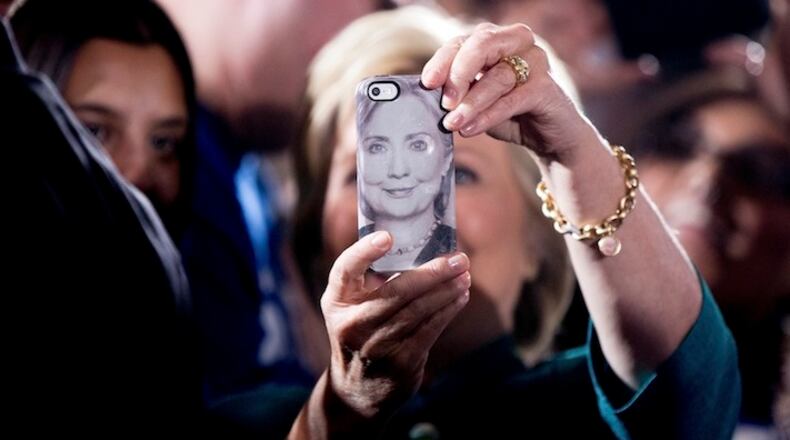WASHINGTON — Despite several attempts to target Hillary Clinton for possibly mishandling classified information, none of the remaining investigations is likely to uncover new information or hurt the presidential hopeful before the election.
Lawmakers have asked the Department of Justice to look into whether Clinton committed perjury, but it's highly unlikely it will conduct another examination after deciding against criminal charges. A newly reopened State Department inquiry may unfold secretly. And no bombshells are expected from the pending lawsuits over Clinton's use of a personal email account.
By Friday, the FBI will send the State Department several thousand emails the bureau found during its investigation, a Justice Department lawyer told a judge Monday, but the State Department will not release them now.
"If anything, we might see some mildly interesting or embarrassing stuff released," said Bradley Moss, a Washington lawyer who handles national security information. "But I don't suspect there's going to be any smoking guns between now and the election. This is going to start to slow down."
Republicans accuse the Obama administration of trying to protect Clinton's presidential bid as they persist in questioning her fitness for the White House given her sloppy actions with the government's secrets.
"We're not on a witch hunt," said Michael Bekesha, a lawyer for the conservative group Judicial Watch, which sued the State Department over Clinton's email. "These are questions that remain."
Clinton, who will officially accept the Democratic Party's nomination for president next week, has been dogged for more than a year for exclusively using personal email routed through a private server while serving as the nation's top diplomat.
Her campaign and Democratic allies have repeatedly called the investigations part of a taxpayer-funded political attack to hurt her. But a majority of Americans disapprove of the FBI's recommendation against criminal charges for Clinton and an even larger majority say the issue "makes them worried about how Clinton might act as president," according to an ABC/Washington Post poll released last week.
Reps. Jason Chaffetz, R-Utah, the chairman of the House Oversight and Government Reform Committee, and Bob Goodlatte, R-Va., the chairman of the House Judiciary Committee, asked the Justice Department last week to look into whether Clinton had lied about her email last year.
The case is assigned to the U.S. attorney in Washington, but prosecutors are not required to open a full-blown criminal investigation or even explain why they won't.
Peter Zeidenberg, a former federal prosecutor who handled cases against public officials, including Vice President Dick Cheney's chief of staff, I. Lewis "Scooter" Libby, said it was extremely unlikely that the Justice Department would investigate. "No prosecutor would bring this case," Zeidenberg said. "These cases are very difficult to bring."
After a yearlong investigation, the FBI announced earlier this month that Clinton and her aides had been "extremely careless" but recommended no charges.
FBI Director James Comey said his investigators had found no evidence that Clinton had lied to the FBI. Chaffetz and Goodlatte now want Comey to look into whether Clinton had lied to Congress about her email.
Almost no one is prosecuted for lying to Congress, according to a study by lawyer P.J. Meitl. Now a federal prosecutor in Dallas, Meitl found that only six people had been convicted of perjury or related charges in relation to Congress in the last 60 years.
"This is due to a number of reasons: The applicable statutes impose considerable hurdles in terms of proof and offer strong defenses, a lack of political will to enforce the law and an increasing realization on the part of witnesses and the attorneys who represent them that prosecutions for lying to Congress are extremely rare," he wrote.
After the FBI closed its inquiry, the State Department's Bureau of Diplomatic Security resumed a review of how Clinton or her employees had handled classified information. Possible outcomes of a review include an employee or former employee's security clearance being suspended or revoked.
The department declined to say which secretaries or current or former employees are under review, when the inquiry would be finished or even whether it would announce the findings.
But many experts say it's unlikely that Clinton's security clearance would be revoked.
Paul Pillar, a former CIA official and deputy chief of the intelligence community's counterterrorism center who serves as a senior fellow at the Brookings Institution, said that when current or former employees lost security clearances, it was not for carelessness. "When it has happened, it has been more intentional," he said.
The State Department could consider the FBI's investigation, including its conclusion of carelessness,
It's common practice to suspend a security clearance when an investigation or internal inquiry is ongoing, according to national security experts. Clinton, however, maintained hers.
Clinton's Top Secret/Sensitive Compartmented Information clearance was revalidated after she left office. After she and Donald Trump secure their party's nominations for president, they are expected to begin receiving intelligence briefings.
Republicans in the House of Representatives, including Speaker Paul Ryan of Wisconsin, asked that Clinton not receive the briefings, but James Clapper, the director of national intelligence, denied their request.
On Monday, U.S. District Judge Emmet G. Sullivan heard arguments from Judicial Watch, which is suing for access to more Clinton emails and wants her to discuss her unprecedented server arrangement under oath.
Six people _ ranging from Bryan Pagliano, a former IT aide to Clinton, to high-ranking State Department officials _ have already been deposed. Pagliano asserted his constitutional right against self-incrimination "more than 125 times" during a court-ordered deposition.
About the Author
Keep Reading
The Latest
Featured


